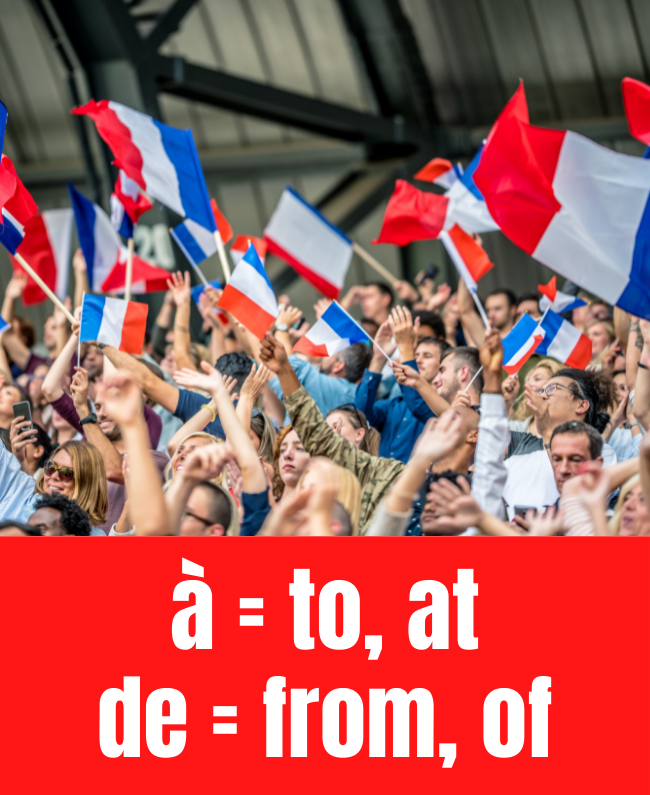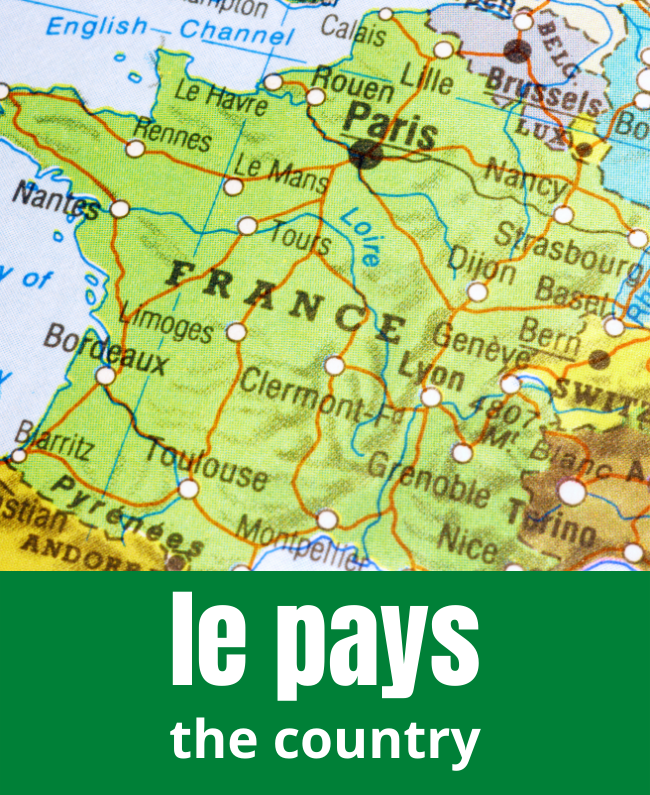Learning the most common words is the first step to learning to speak fluently. Rather than just providing a list of top-100 words without any structure, we’ve created a list based on language sub-areas such as common adjectives, prepositions and verbs. We’ve also broken our list down into noun groups such family, clothing and much more.

What are the most common French words?
Most frequently used French words
The most common French words are: Oui (yes), non (no), merci (thank you), je (I), tu/vous (you), le/la/les (the), un, une des (a, an and some), le/la/les (it, them), et (and) and mais (but).
Top 10 French words in a nutshell
These are the top ten frequently most used words in the French language:
- Oui yes
- Non no
- Merci thank you
- Je I
- Tu/vous you
- le, la, les the
- Un, une, des a, an, some
- le, la, les it, them
- Et and
- Mais but
Example sentences with the most common words:
- Oui, je parle français. Yes, I speak French.
- Non, je ne parle pas français. No, I don’t speak French.
- Merci beaucoup. Thank you very much.
- Je mange le pain. I eat the bread.
- Tu manges la salade. You seat the salad.
- Vous mangez la pizza. You eat the pizza.
- Le garçon chante. The boy sings.
- La fille nage. The girl swims.
- Les enfants chantent. The children sing.
- Un garçon écrit. A boy writes.
- Une fille dort. A girl sleeps.
- Des enfants étudient. Some kids study.
- Je le/la mange. I eat it.
- Je les mange. I eat them.
- Marc et Sylvie. Marc and Sylvie.
- Il aime Sylvie mais il est trop timide. He likes Sylvie but he’s too shy.
Audio at regular speed:
Same audio but a little slower:

How to say “not” in French
In French, to say “not”, wrap ne…pas around a verb. For example, Je ne parle pas français (I don’t speak French). This is called negation.
- Ne…pas not
- Je ne sais pas I don’t know
Articles: words for “the” and “a, an”
The articles in French (words for the and a/an) must agree in gender and number with the noun they describe. The words for “the” are called the definite article and the words for “a” and “some” are called the indefinite article.
- Le the (masculine)
- La the (feminine)
- Les the (plural)
- L’ the (comes before noun starting with a vowel)
- Un a or an (masculine)
- Une a or an (feminine)
- Des some (plural)
Personal pronouns
One of the first steps in learning French is to learn the personal pronouns. These refer to words for people (I, you, he, she, etc.).
- Je I
- Tu you
- Il he
- Elle she
- On one, we, people in general
- Nous we
- Vous you (formal)
- Ils they (all men or mixed company)
- Elles they (female only)
Stressed pronouns
A second kind of pronoun that’s use for people is is called a stressed pronoun. These are words like me, him and her in English.
- Moi me
- Toi you
- Lui him
- Elle her
- Nous us
- Vous you
- Eux them
- Elles them (female only)
Most common verbs
Verbs are action words. For example, “I go” or “I eat”. In the list below we included 10 commonly used verbs in the first-person singular (je) form.
- Je suis I am
- J’ai I have
- Je fais I make, I do
- Je vais I go
- Je parle I speak
- Je mange I eat
- Je sais I know
- Je veux I want
- Je dois I must
- Je peux I can

Words for politeness and greetings
It’s essential to learn words for politeness and greetings. Bonjour means hello and au revoir means good-bye.
- Bonjour Hello, good morning
- Au revoir goodbye
- Merci thank you
- De rien you’re welcome
- Salut hi and bye
- Bonsoir good evening
- Bonne nuit good night
- S’il vous plaît please (formal)
- S’il te plaît please (informal)
French numbers
Learning to count to ten is essential for any beginner. Learning these most basic numbers will help you to ask how much things cost, tell time and say the date.
This lesson covers the French numbers 1-100 in detail.
- Un one
- Deux two
- Trois three
- Quatre four
- Cinq five
- Six six
- Sept seven
- Huit eight
- Neuf nine
- Dix ten
Connecting words
Connecting words or conjunctions are words that are used to join two parts of sentence together.
- Et and
- Ou or
- Si if
- Mais but
- Quand when
- Que that
- Qui who, that
- Comme like, as
- Parceque because
French prepositions
A preposition is a word that introduces another part of a sentences. For example, “in the bathroom”, “at the movies” or “with mom”.
- À to, at
- De from, of
- Avec with
- Pour four
- Par by
- Sans without
- Contre against
- Dans in, inside of
- En in
- Sur on, on top of
- Chez at the home, place of
- Avant before
- Après after

French adverbs
An adverb is a word that’s used to describe how you do something. For example, “I run quickly” or “You speak slowly”.
- Bien well
- Mauvais poorly
- Vite quickly
- Rapidement quickly
- Lentement slowly
- Heureusement fortunately
- Seulement only
- Rarement rarely, seldom
- Souvent often
- Beaucoup a lot
- Un peu a little, a bit
- Trop too, too much
Family members
Learning the words for family members is essential for getting to know people.
- le père father
- la mère mother
- le frère brother
- la sœur sister
- le fils son
- la fille daughter
- le bébé baby
- l’enfant child
- le grand-père grandfather
- la grand-mère grandmother
- le cousin, la cousine cousin
- l’oncle uncle
- la tante aunt
French adjectives
Adjectives are describing words. For example, “a big house” or “an intelligent girl”. The French rules for adjectives are very complex as the adjective must agree in number and gender with the noun (the thing) it’s describing (talking about). The -e in parenthesis below indicates the feminine form of the adjective.
- grand(e) big
- petit(e) little
- bon (bonne) good
- mauvais(e) bad
- beau (belle) beautiful
- joli(e) pretty
- jeune young
- vieux (vieille) old
- heureux (heureuse) happy
- triste sad
French colors
Learning the colors is very important for describing the things we see. Colors are also adjectives as they are description words.
- Rouge red
- Orange orange
- Jaune yellow
- Blanc white
- Noir black
- Bleu blue
- Vert green
Question words
Question words are words used for seeking information when asking a question. For example: Who, what, where, when and why.
- Quel (Quelle) which
- Qui who
- Quoi what
- Où where
- Quand when
- Why pourquoi
Words about time
Words about time include days of the week, months and times of day.
The following is just a sample of these words. These pages cover these words in detail: Telling time and the days of the week,
- Aujourd’hui today
- Hier yesterday
- L’heure hour
- Le temps time
- Quelle heure what time
- Midi noon
- Minuit midnight
- Lundi Monday
- Mardi Tuesday
- Mercredi Wednesday
- Jeudi Thursday
- Vendredi Friday
- Samedi Saturday
- Dimanche Sunday

Food and drinks vocabulary
It’s nice to learn a few food words.
- le pain bread
- la viande meat
- le lait milk
- le fromage cheese
- le poulet chicken
- la salade salade
- la pomme apple
- la pomme de terre potatoe
- le riz rice
- le gâteau cake
- l’eau water
- le café coffee
Names of places
It’s important to know how to say the names of places. Here’s a list of frequently used words.
- le pays country
- l’état state
- la ville city
- le village town
- l’école school
- l’église church
- la maison house
- le bureau office
- le supermarché supermarket
- la poste post office
- la bibliothèque library

Clothing words
Here’s a brief list of some clothing words.
- la chemise shirt
- le pantalon pants
- la jupe skirt
- la robe dress
- le chemisier blouse
- le pull sweater
- les chaussures shoes
- les chaussettes socks

